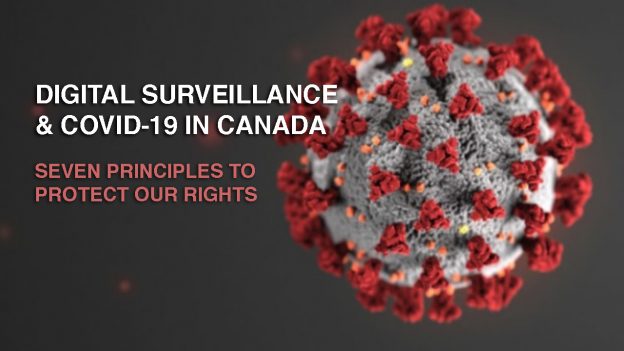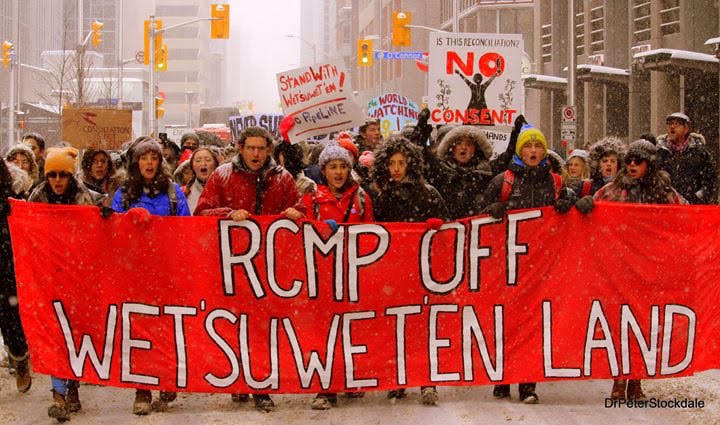The International Civil Liberties Monitoring Group has joined a group of privacy experts and civil society organizations to release a set of principles for protecting the rights and privacy of people in Canada throughout the fight against COVID-19. The principles come at a critical time, with Google and Apple committing to tracking COVID-19 exposure through cell phone operating systems; Alberta having announced plans to use cell phone tracking to monitor quarantine compliance during COVID-19; and Prime Minister Justin Trudeau confirming that ‘all options are on the table.’
The full statement is below, or download PDF. You can also watch the video above.
The principles call for caution and restraint in any rollout of new emergency measures, such as data collection from telecom companies or location tracking to monitor the spread of the virus or enforce quarantines. They urge the government to prioritize other measures to keep people safe and in their homes first, and favour voluntary data sharing solutions, as has been proposed in the UK, over any non-voluntary data collection.
OpenMedia Executive Director Laura Tribe said, “The use of data will be critical in the fight against COVID-19, but we cannot resort to draconian surveillance without oversight or accountability. People in Canada are rightly concerned about how any kind of data tracking or surveillance powers brought in to tackle this emergency would impact our rights. There may be great pressure to adopt extraordinary measures in response to this situation, but the government must consider the cost to our privacy, values and human rights. How our government treats its citizens in this time of emergency will be one of the greatest tests of our democracy.”
Tim McSorley, National Coordinator at the International Civil Liberties Monitoring Group, said, “Canada is facing an unprecedented health crisis that requires unprecedented action to flatten the curve and stop the spread of COVID-19. In their pursuit of this important goal, we urge Canadian officials at all levels to use restraint around surveillance activities that infringe on our most fundamental rights, including privacy, freedom of assembly and freedom of movement.
“As we have seen in other contexts, particularly the so-called War on Terror, in times of crisis new surveillance powers that are meant to be targeted and temporary can become widespread and permanent. Any powers must explicitly contain time-limits and public oversight, and it is crucial that any health-related surveillance be kept separate from law enforcement and intelligence activities.”
The letter urges the government of Canada to follow these seven principles when considering any kind of enhanced digital surveillance or data collection:
- Prioritize approaches which do not require any surveillance or data gathering to encourage people to stay at home;
- Due process for adopting any new powers;
- Favour consent in any data sharing initiatives;
- Put strict limits on data collection and retention;
- Put strict limits on use and disclosure;
- Oversight, transparency and accountability;
- Any surveillance efforts related to COVID-19 must not fall under the domain of security, law enforcement or intelligence agencies.
Read the full press release here [PDF].
Joint statement: Digital surveillance technologies and COVID-19 in Canada
April 15, 2020
As the Canadian government seeks to respond to the COVID-19 pandemic, the possibility of using smartphone tracking or other mass public data collection to track infections or ensure compliance with rules has been raised.
The pressure to adopt extraordinary measures in response to extraordinary situations is understandably high. But we must make sure to carefully consider the cost to our privacy, values and human rights. We must emphasize that any measures that amount to mass warrantless surveillance of identifiable people in Canada would not be a proportionate or reasonable response, even in these difficult times.
People in Canada are concerned about the possibility of invasive emergency measures, and for their potential to continue undermining our rights after the current crisis is over. Even in times of crisis, mass digital surveillance tools pose a unique and insidious threat to our fundamental values. No data set fully represents the world, and biases and flaws in data and the algorithms applied to it have been shown to disproportionately impact already marginalized communities in our society. There is also a real risk that they undermine public health measures by providing a false sense of security, or undermine trust in and disclosure to public institutions. It is therefore crucial that all discussions about enhanced surveillance take place transparently and openly, before any new measures are put in place.
We, the undersigned organizations and experts, urge the government of Canada to follow these seven principles when considering any kind of enhanced digital surveillance or data collection:
1. Prioritize approaches which do not require any surveillance or data gathering to encourage people to stay at home
Make full use of public education, financial assistance, and other options and support which will allow people in Canada to practice social distancing, and avoid infection, as well as testing at scale to identify people who have been infected. Any surveillance-based measures must only be relied on where demonstrably necessary and as a last resort.
2. Due process for adopting any new powers
Any new powers must be adopted through a legislative process, following transparent and open public debate. Invasive measures must be referred to the courts and the privacy commissioner for an assessment of their legality, effectiveness and proportionality. As the federal Privacy Act remains an inadequate and outdated instrument, data gathering must be accompanied by binding rules to ensure data minimization, strict necessity and proportionality. Such measures must be temporary, with a defined end date and review periods regularly scheduled. Ongoing reviews must be public and transparent, and must consider the impact and effectiveness of any new measures as well as their continued necessity.
3. Favour consent in any data sharing initiatives
In any government use of mass data technologies to address the pandemic, options that allow people the choice to volunteer their data must be strongly preferred to non-voluntary data collection. Voluntary measures must be truly voluntary, and free from coercion of any kind. Neither leaving location services on nor an agreement signed with their mobile provider on registration can be understood as providing this voluntary consent. Any voluntarily provided data must be subject to the same limitations and considerations of proportionality and use as all other data, and subject to ‘ongoing’ consent – ie, subject to withdrawal by the provider at a later date.
4. Put strict limits on data collection and retention
Any adopted measure must ensure that data collection is minimized, limited to collecting data that is strictly necessary for established public health considerations directly relating to the declared emergency, and proportionate, keeping in mind the sensitivity of the data being collected. Any data collected must be fully and promptly deleted as soon as it is no longer necessary to contain the pandemic.
5. Put strict limits on use and disclosure
The intended use of any collected data must be specifically and clearly defined, and that data should only be used for its intended purpose. All data must be de-identified and anonymized. Any data gathered must only be used for the public health purposes that justified its collection, and may only be disclosed to public health bodies. No data gathered through these measures can be used to achieve law enforcement or immigration objectives, or for commercial purposes, including in de-identified format.
6. Oversight, transparency and accountability
Any new rules or technology adopted during this period must have independent oversight, must be transparent to the public, and must provide options for recourse with regards to breaches, misuse, or other violations of rights. This independent oversight must be additionally empowered to remedy any inaccuracy or bias in any adopted measures, as many digital surveillance and analytic tools have been found to be deeply biased, particularly against marginalized groups.
7. Any surveillance efforts related to COVID-19 must not fall under the domain of security, law enforcement or intelligence agencies
The current pandemic situation is a public health crisis, not a matter of national security. Security, law enforcement and intelligence agencies must not be involved in any form of public health surveillance or data collection. Moreover, the line between the data held by Canada’s health and security establishments must be maintained throughout.
Sincerely,
OpenMedia
B.C. Civil Liberties Association (BCCLA)
BC Freedom of Information and Privacy Association (FIPA)
International Civil Liberties Monitoring Group (ICLMG)
Samuelson-Glushko Canadian Internet Policy & Public Interest Clinic (CIPPIC)
Since you’re here…… we have a small favour to ask. Here at ICLMG, we are working very hard to protect and promote human rights and civil liberties in the context of the so-called “war on terror” in Canada. We do not receive any financial support from any federal, provincial or municipal governments or political parties. You can become our patron on Patreon and get rewards in exchange for your support. You can give as little as $1/month (that’s only $12/year!) and you can unsubscribe at any time. Any donations will go a long way to support our work. |




 The International Civil Liberties Monitoring Group (ICLMG) condemns the RCMP’s armed invasion of unceded Wet’suwet’en territory, and the ongoing repression and criminalization of Wet’suwet’en land defenders, their supporters and journalists.
The International Civil Liberties Monitoring Group (ICLMG) condemns the RCMP’s armed invasion of unceded Wet’suwet’en territory, and the ongoing repression and criminalization of Wet’suwet’en land defenders, their supporters and journalists.